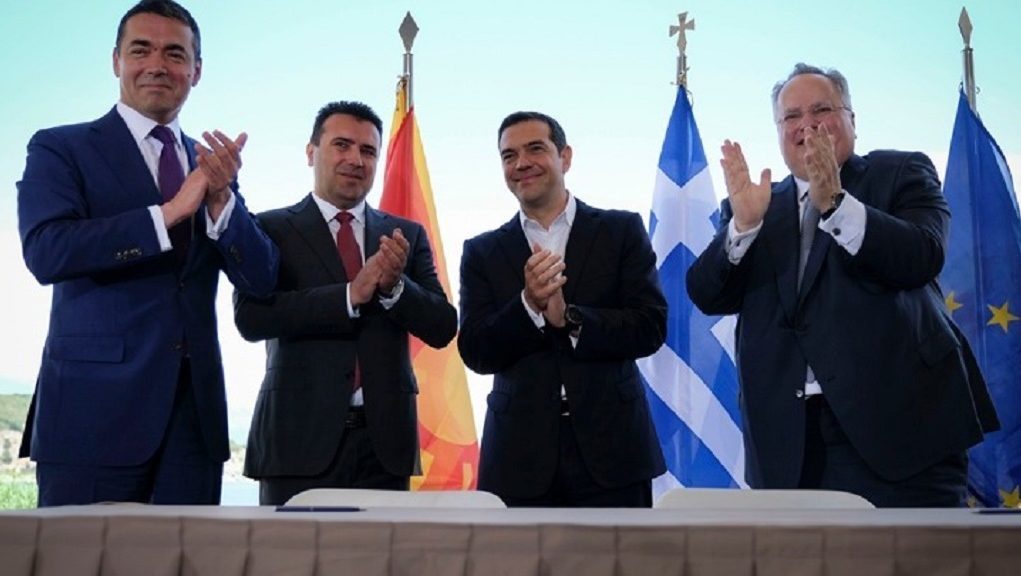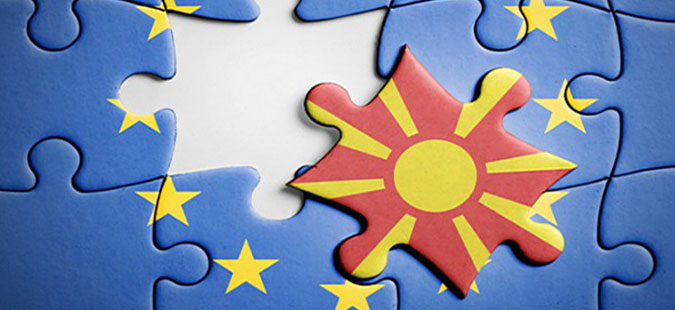Miroslav Grchev (1955) is an architect, professor on Faculty of Architecture at St.Cyril and Methodius University in Skopje, cartoonist, graphic designer and writer. He is known for having designed the current flag of FYROM. Fromm 1996-2000 he was mayor of central Skopje municipality “Centar” elected with the Social Democratic Union of Macedonia (SDSM). He has been one of the most ardent critics of the identity policy of “antiquization” and of the associated urban plan Skopje 2014. In his interview with Greek News Agenda*, Miroslav Grchev speaks in favour of the Prespes Agrement, acuses the former VMRO government’s identinty building practices and argues that the exact symmetry of negative reactions witnessed in both sides of the border testifies to the quality of the Agreement.
What is your opinion on the Prespes Agreement?
I think the Prespes Agreement is a rare example of an elegant and rational solution to a cumbersome, irrational dispute and it seems it will untie a knot that was designed never to be untied. The problem, as it was created, is woven with irrational threads of myths, ethnogeneses, cultural identities, painful memories of historical tragedies and a whole lot of other irrational and emotional yarn. Under such circumstances, the elegant line which is drawn in the Agreement sets apart all points of old disagreements and radiates not only good will but also outstanding diplomatic aesthetics, mastery and wisdom.
Does the agreement provide a space for moderate voices to be heard or does it polarize public opinion?
The Prespes Agreement is an excellent selective matrix that unmistakably distinguishes the people – from both sides of the border – according to the dominant moods and states of mind. I think that breaking up the myth of the insolvability of the name dispute, and the neutralization of the bitter resentment, anger and hopelessness that it has been causing for decades, will release positive energy and amiable feelings both in Greece and in Macedonia. Hopefully, this positive mood will win over the hardcore nationalists, professional haters and bloody-eyed patriots. Finally, there is no better proof of the mathematical perfection of the compromise than the complete symmetry of the reactions of the opponents of the Agreement from both sides of the border. This symmetry – which reaches paroxysm with complete matching of the words, contents and accusations that the hardened nationalists from both sides are throwing at their governments – is the most solid guarantee that it is a perfectly balanced compromise, a true diplomatic masterpiece.

Considering the crisis of the EU project during the last years, is EU integration an exciting enough prospect, able to mobilize public opinion in favor of the Agreement?
Macedonia has been sinking into a crisis for too long – and not just an economic one – but in the past decade, it has become an autoimmune disease of the entire society, so I do not believe that the dark clouds that are looming over the European project can negatively affect the pro-European attitude of our citizens. You know, in the decade of the fascistoid mafiocracy of VMRO-DPMNE, the Euroatlantic integration became the only horizon of hope for the most of Macedonian citizens
A very sensible issue included in the Agreement is the delineation of what is Slavic and what is Hellenic culture. Can an agreement based on highlightening the differences foster rapprochement and cultural dialogue?
In my opinion, it is exactly the emphasis of diversities that is the core of the wisdom of the Agreement. So, the juxtaposition of our cultural, ethnic and state entities is the true foundation for building friendship, cooperation and solidarity. The essence of the “Macedonian problem” has for more than a century rested precisely in the superposition, the overlapping of state and national projections of interest for the same piece of land – the region of Macedonia. These overlapping state interests have caused many historical and human tragedies in the gruesome first half of the 20th century, and the memories of these tragedies haven’t ceased to poison human souls ever since. Looking back in the past with blood-shot eyes, blurred by emotions, has always been an inspiration and fuel for ultranationalist sentiments.The ultranationalist’s state of mind always stems from the victimization of its own people and the creation of mortal danger threathening the nation. This provoked fear is easily instrumentalised into hatred towards the other: at home one is considered a traitor, and abroad – an enemy. For them, every compromise is capitulation, for they are always in holy war against everyone. Therefore, the wise approach of articulating diversity in the Prespes Agreement should leave the faux-patriots without fuel, and should represent a line of warm, friendly contact for the positive-thinking people.

You yourself have played a role in nation branding by designing the country’s flag and coat of arms. On the other hand, you fiercely opposed the Skopje 2014 antiquization project. How easy it is for the citizens to free themselves from symbols (e.g. Alexander the Great) and the corresponding narratives after so many years?
A year has passed since the fall of the soft despotism of VMRO and the new government still cannot get rid of the monuments, buildings and facades that the authoritarian government of Gruevski built in its own glory. The schizophrenic reaching for the images of Alexander the Great, Philip II and other symbols of the classic Hellenistic period, and their conversion into identity symbols of the nation is, for me, the cruelest crime that the previous government has committed against its own citizens. Entire generations of young people have been turned into persons with a divided and completely grotesque false identity, so, in my opinion, the biggest mistake of the new democratic government is the delay in the dismantlement and evacuation of these atrocities from the public spaces. The liberation from the false identity is obviously not easy but it is more than necessary.
Read also via Greek News Agenda: Othon Anastasakis: We must focus on the positive outcomes of the Prespes Agreement; “The name issue and the inescapable national road” by Prof. Nikos Marantzidis
*Interview by Lina Syriopoulou
TAGS: FOREIGN AFFAIRS | GLOBAL GREEKS | INTERNATIONAL RELATIONS













